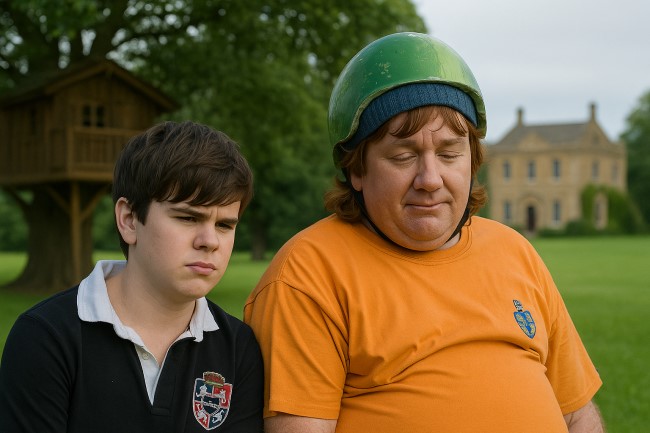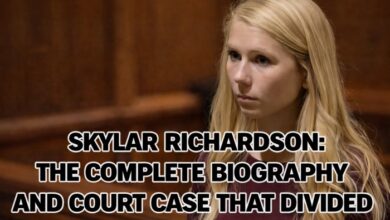Gavin McGregor: The Young Heir and Future Earl of Gayhurst in Netflix’s Lunatics

In the satirical mockumentary Lunatics, created by Chris Lilley for Netflix, one of the standout characters is Gavin McGregor, a 12-year-old boy destined to inherit the prestigious title of Earl of Gayhurst. With his aristocratic background, lavish lifestyle, and exaggerated personality traits, Gavin offers a sharp comedic lens into the absurdities of class, privilege, and inherited power. Portrayed entirely by Chris Lilley, the character represents a parody of upper-class Britain, blending humor and social commentary with a touch of childhood mischief.
Gavin McGregor’s story combines satire, comedy, and critique, showing how a young boy, raised amidst grandeur, struggles to balance innocence with the heavy expectations of nobility.
The Creation of Gavin McGregor
Chris Lilley’s Vision
Chris Lilley is known for creating eccentric, exaggerated characters that mirror real-world archetypes. In Lunatics, he plays six different personas, and Gavin McGregor stands out as the embodiment of privilege. Through Gavin, Lilley dives into the life of a child who has been told since birth that he will one day inherit a title, estate, and wealth.
Lilley’s comedic approach uses the documentary style to highlight Gavin’s naivety, arrogance, and occasional vulnerability. The exaggerated delivery adds humor, but beneath it lies a critique of how privilege can shape—and distort—youthful personalities.
Character Overview
A Future Earl with a Child’s Heart
Gavin McGregor is introduced as a polite yet pompous 12-year-old living on a grand English estate called Gayhurst. He is portrayed as the “future Earl of Gayhurst”, a title that carries both prestige and pressure. Despite his privileged environment, Gavin often behaves like any other child—curious, energetic, and prone to mischief. The contrast between his aristocratic role and his childlike innocence creates the series’ central humor.
He commands respect from adults and peers but also seeks friendship and fun through his own social group known as “The Frothers”, a club he runs from his elaborate treehouse. This blend of aristocracy and playground politics reveals how his youth clashes with his supposed maturity.
The Setting: Gayhurst Estate
A Symbol of Heritage and Hierarchy
The Gayhurst estate serves as more than just Gavin’s home—it symbolizes centuries of tradition, privilege, and expectation. Within the walls of the estate, Gavin learns the etiquette of nobility, attends formal gatherings, and interacts with staff who treat him with deference. Yet he also tries to break free from this formal world through games, humor, and boyish adventures.
The estate’s grandeur highlights the gap between social classes, making Gavin’s story both comic and tragic. It shows how inherited wealth can isolate a person even at a young age, surrounding them with responsibility long before they are ready to understand it.
Themes and Symbolism
Satire of Aristocracy
At its core, Lunatics uses Gavin McGregor to mock the outdated ideals of hereditary titles and the absurdity of social class distinctions. His exaggerated mannerisms, posh accent, and sense of entitlement underline how the upper class can appear disconnected from modern society.
Lilley’s performance pokes fun at the rituals of the elite—the garden parties, the historical societies, and the constant need for public image. Through Gavin, the series humorously questions whether titles like “Earl” have any relevance in today’s world.
Childhood Versus Responsibility
Gavin’s story also carries emotional weight. Beneath the laughter lies the tale of a boy caught between childhood freedom and adult duty. He wants to play with friends, climb trees, and joke around, but he is constantly reminded of his future role. This tension mirrors real-life situations where children of wealth or fame are burdened by expectations too heavy for their age.
Identity and Self-Discovery
Gavin’s journey is also about finding identity in a world that defines him before he can define himself. Every moment of his life is scripted by tradition—how to speak, how to behave, and even how to think. As a result, he grapples with authenticity, questioning whether he truly believes in the world he is being groomed to inherit.
Personality and Behavioral Traits
Spoiled Yet Sympathetic
Gavin is spoiled and self-important, yet his childish innocence makes him strangely endearing. He genuinely wants to be liked and respected, though his privilege blinds him to how others perceive him. His attempts to show leadership often backfire comically, especially when his servants or friends humor him rather than taking him seriously.
His interactions with his aunt, teachers, and estate workers reveal layers of both arrogance and insecurity. Despite his wealth, he craves attention and validation—traits that make him human and relatable beneath the satire.
Gavin’s Social World
The Frothers and the Treehouse
One of the highlights of Gavin McGregor’s life is his group of friends known as The Frothers. Together, they hold meetings in a luxurious treehouse, playing games and forming “laws” that mimic adult institutions. This playful mimicry adds comedic value while reflecting how children imitate the structures they see around them.
In this way, Lunatics cleverly mirrors how the ruling class perpetuates itself—through imitation, repetition, and unspoken hierarchy—even in the innocence of childhood games.
The Message Behind the Comedy
A Commentary on Privilege
While Gavin McGregor’s storyline is presented with humor, it delivers a strong message about privilege and power. His ignorance of normal life, his belief that every whim must be obeyed, and his constant need for recognition all mirror the flaws of inherited status.
The audience laughs at his antics, but the laughter is tinged with awareness. It becomes clear that Gavin is not simply ridiculous—he is a product of his environment. The show uses this realization to critique how privilege shapes individuals from birth.
Reflection of Modern Society
Even though Lunatics exaggerates its characters, Gavin’s world is not far removed from reality. Many young heirs and wealthy children grow up surrounded by people who cater to them, leaving them ill-prepared for genuine relationships and real-world challenges. Through satire, the series invites viewers to reflect on how society still clings to hierarchy and status symbols.
Critical Reception
Mixed Reviews
Gavin McGregor’s storyline received both praise and criticism. Fans appreciated the absurd humor and Lilley’s ability to embody a 12-year-old aristocrat convincingly. However, critics argued that the comedy sometimes relied too heavily on caricature. Some found the portrayal unsettling, given that an adult actor played a child, while others saw it as a bold artistic choice that added to the satire.
Cultural Impact
Despite controversy, Gavin remains one of the most memorable characters from Lunatics. His blend of innocence, arrogance, and irony makes him a fascinating figure in modern television comedy. The character encapsulates the essence of Chris Lilley’s humor—provocative, layered, and socially aware.
Conclusion: The Legacy of Gavin McGregor
Gavin McGregor represents more than just a funny aristocratic child. He is a mirror reflecting society’s obsession with wealth, title, and power. Through him, Lunatics delivers sharp commentary on the absurdity of inherited privilege while reminding viewers that behind every façade of superiority lies a very human story.
As the future Earl of Gayhurst, Gavin is both a product and a prisoner of his world. His journey in Lunatics may be filled with humor, but it subtly exposes the hollow nature of social class systems that still linger today.



